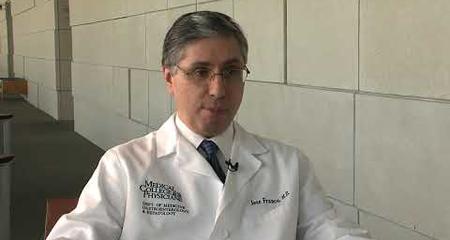Froedtert & the Medical College of Wisconsin treats a wide variety of stomach diseases and disorders.
Dyspepsia
Dyspepsia is a functional disorder of the stomach involving symptoms such as upper abdominal pain, bloating, a feeling of fullness (with little intake of food), nausea or belching. Symptoms are often provoked by eating. Many people who have dyspepsia may also have irritable bowel syndrome.
Cyclical Vomiting Syndrome
Cyclic Vomiting Syndrome is a condition involving recurrent, prolonged episodes of severe nausea and vomiting with no apparent cause, with normal periods of health in between.
Gastroparesis (Stomach Paralysis)
Stomach Paralysis is a disorder in which the stomach is unable to contract normally; due to this condition, it either, moves food slowly into the small intestine, or no longer moves food into the small intestine. This occurs when nerves to the stomach are damaged or stop working. People with autoimmune nervous system dysfunction or diabetes may experience this disorder.
Gastritis
Gastritis is an inflammation of the lining of the stomach (may be acute or chronic). It can have many causes, including prolonged use of nonsteroidal anti-inflammatory medications (NSAIDs) such as aspirin or ibuprofen, H. pylori infection or alcohol abuse.
Symptoms include abdominal pain, belching, bloating, nausea, vomiting and a feeling of fullness or burning.
Endoscopy is used to view the stomach lining to check for inflammation and possibly remove a tissue sample for testing.
Ulcers
A Ulcer is an open sore on the lining of the stomach (gastric ulcer) or duodenum (duodenal ulcer). Peptic ulcers occur in areas that come in contact with digestive juices from the stomach. They may be caused or worsened by:
- Prolonged use of over-the-counter, nonsteroidal anti-inflammatory medications (NSAIDs) such as aspirin or ibuprofen
- Bacterial infection (H. pylori). (H. pylori infection is usually acquired from contaminated food and water and through person to person spread.)
Stomach Tumors
Tumors (benign or malignant) that form in the lining of the stomach. Symptoms may include bleeding, obstruction and weight loss.
- Gastric outlet obstruction is a tumor obstructs the channel through which the stomach empties and thus prevents the normal emptying of the stomach.
- Hiatal hernia occurs when the upper part of the stomach protrudes into the chest through a tear or weakness in the diaphragm.
- Lymphoma — MALT (mucosa-associated lymphoid tissue) is a type of lymphoma (cancer that arises from the lymph tissue) found in the stomach. H. pylori bacterium are believed to be involved in causing MALT lymphoma. (H. pylori infection is usually acquired from contaminated food and water and through person to person spread.) Endoscopic ultrasound (EUS), along with other procedures, may be used to view the size and depth of the tumor. Treatment may include the use of antibiotics to wipe out the bacteria or radiation therapy.
- Stomach cancer, also known as gastric cancer.
Varicose Veins in the Stomach or Esophagus
Varicose veins are blood vessels that bulge and twist due to a defect in the valves. Varicose veins may be present in the esophagus or stomach as a result of liver disease or blood clots in the portal vein system. Large varicose veins in the esophagus or stomach can rupture and bleed.
Recognized as High Performing by U.S. News & World Report
Froedtert Hospital is recognized by U.S. News & World Report as high performing in three adult specialties and 16 procedures and conditions, including gastroenterology and GI surgery.Virtual Visits Are Available
Safe and convenient virtual visits by video let you get the care you need via a mobile device, tablet or computer wherever you are. We'll assess your condition and develop a treatment plan right away. To schedule a virtual visit, call 414-777-7700.





